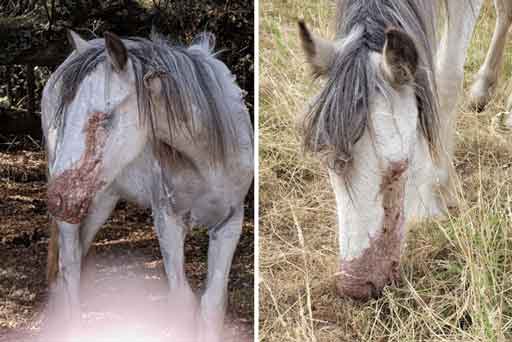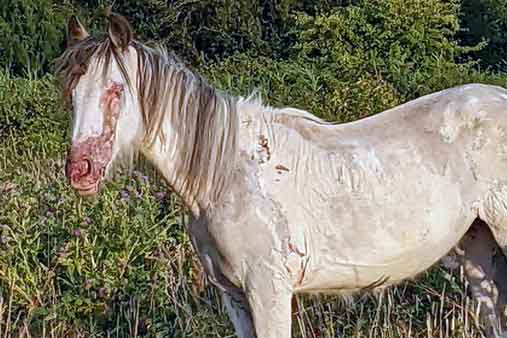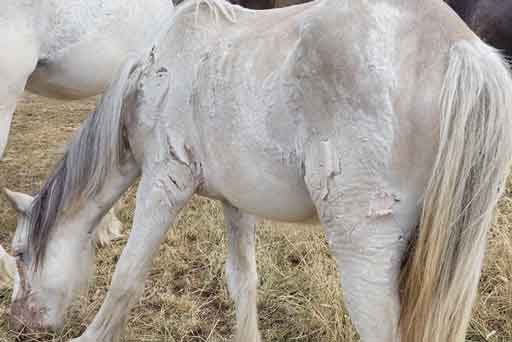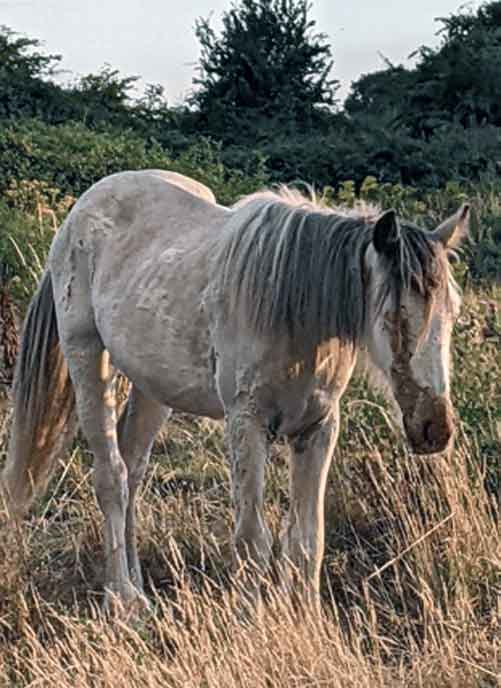CONVICTED (2024) | John Darren Ware, born c. 1977, of 110 Blakemere Crescent, Cosham, Portsmouth PO6 3SH – left eight ponies unattended in a field heavily contaminated with poisonous weeds.

Ware, who is a traveller with a previous conviction for illegal dog breeding, left the eight equines unattended on a patch of council-owned conservation land in Farlington, Portsmouth.

The ponies had suffered toxic burns to their faces, muzzles and bodies. Their injuries are believed to have been caused by a a combination of direct UV sunlight and exposure to St John’s Wort. Ware had also failed to provide them either with shelter or food.
Representatives from the charity World Horse Welfare alerted the RSPCA, which launched an investigation.
Three of the ponies had extensive facial lesions, which were thick, raised, brown and crusting.

The lesions covered the horses muzzles – including nostrils, lips and chin. Raised crusting lesions – which were shedding skin – covered their bodies.
The RSPCA said the animals were left with a “depressed and dull demeanour”.
The other five ponies had similar injuries on their muzzle albeit to a lesser extent.
It was suspected that it was caused by a toxic substance.
Veterinary tests revealed that all eight ponies were in poor health due to inflammation and chronic inflation.
The animals showed evidence of burns to the non-pigmented skin that is consistent with damage by UV light, caused by St John’s Wort.

A veterinary expert wrote in their report: “Certain weeds, like St John’s Wort, contain photodynamic agents that when the horse has contact or ingests the weed there is an exacerbated reaction to sunlight causing burns to the skin.
“This would be termed a primary photosensitisation, other weeds, such as Ragwort can cause damage to organs.
“The resulting damage prevents the filtering of photosensitive waste products so they are retained in other areas of the body, such as the skin, which cause what is known as a secondary photosensitisation.”

The vet added: “Horses suffering from photosensitisation should be removed from direct sunlight, prevented from further contact with the photodynamic agent, protected from the sun with shelter and burns injuries treated. The vet highlighted that burns around the muzzle are particularly painful because it is highly sensitive.”
In court, Ware admitted two animal welfare offences. In mitigation the court heard he was unaware of the severity of the animals’ conditions and thought it was sunburn. He added that he applied sun cream to one of the horses about a week before the visit by the charities but conceded that no veterinary help had been sought.
World Horse Welfare Field Officer Penny Baker said: “This was a truly horrific case. I do not think I have ever seen ponies with so much crocodile-like skin around their muzzles. They must have been in excruciating pain.
“Keeping a horse or pony well is about much more than just food and water – it’s also making sure they do not have access to poisonous plants, can be protected from the elements and of course get prompt veterinary treatment when they need it.
“We are very grateful to the member of the public who alerted us to these ponies, and we were pleased to be able to work with the RSPCA to remove them from this appalling state of neglect.”
Sentencing | 15 days of rehabilitation; £750 in costs and victim surcharge. Banned from keeping horses for ten years (expires August 2034).

Word fail me 🤬